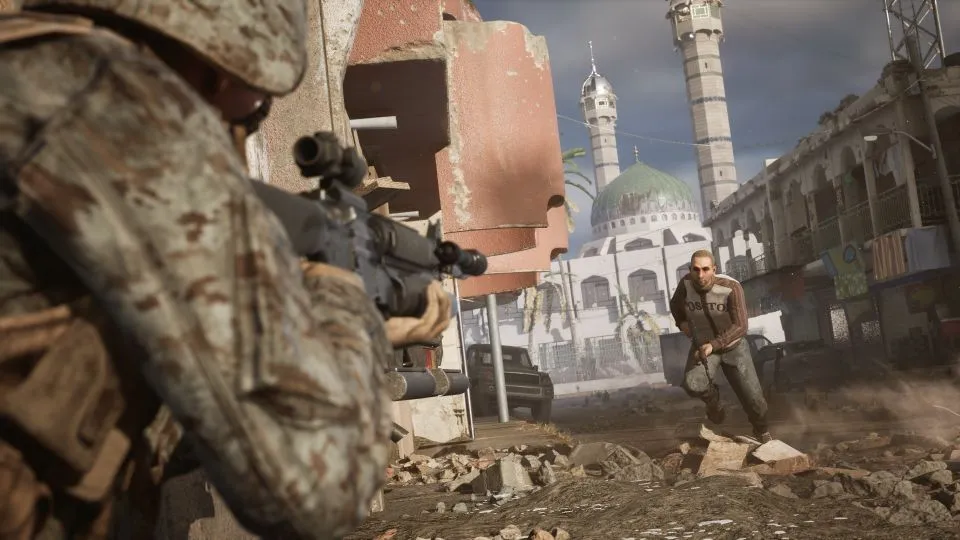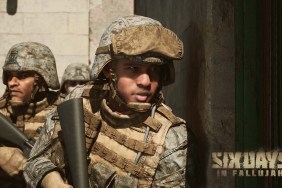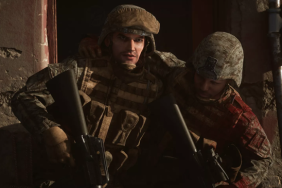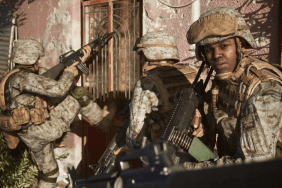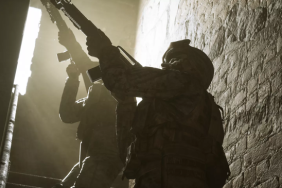Publisher Victura and developer Highwire Games have released an extended gameplay trailer for the controversial Six Days in Fallujah, highlighting the tactical gameplay mechanics of clearing streets, alleyways, and houses, and detailing the procedurally-generated houses and neighborhoods that make every moment unexpected. The “Procedural Architecture” technology is supposed to mimic what it’s like to go door to door and clear houses for soldiers, never knowing what they might find on the other side. While other games offer predictable and learnable map layouts and enemy positions, Six Days in Fallujah aims to keep you on your toes by changing everything up each time you play.
The trailer swaps between a documentary-style interview with US military veteran Sgt. Jason Kyle, who took part in the Second Battle for Fallujah that the game is based on, and voice over narration that details the gameplay mechanics. For more than five minutes, it talks about how harrowing each moment was for US forces sweeping the city and how Highwire Games and Victura have attempted to recreate that tension through squad-based mechanics and procedurally generated buildings to make it unpredictable.
Kyle talks about his experience over those four days, how his squad of 13 marines was decimated to just five by the end of it. He talks about walking confidently down an alley that had been cleared moments before only to be fired upon unexpectedly. A few other veterans are shown talking about the “fatal funnel,” a term for a doorway with the unknown hiding behind it. It could be an empty room, or it could be a machine gun ready to fire.
The gameplay trailer shows the continued focus on realistic military operations. “Marines and soldiers never knew what was waiting for them behind the next door,” the trailer’s narrator says. It calls the opposing combatants “enemies” without giving them a face. The last portion of the trailer gives 35 seconds of time to Iraqi civilians and families. Iraqi civilians who remain anonymous talk about the invasion from a broad perspective. While Kyle and the other veterans share their experiences in detail whilst also directly impacting the gameplay experience, the Iraqi perspective is washed over with third-person terminology and recolors the narrative, ignoring the fact that most Iraqi men of military age were prevented from even leaving the city whether they wanted to or not, and civilians were terrorized, demonized, and murdered by the invading US forces.
In fact, despite promises that at least a small part of the game would focus on an Iraqi father trying to help his family escape, the small segment of the gameplay trailer featuring Iraqi civilians features no gameplay at all and doesn’t allude to the game even highlighting a semblance of the terror Iraqi people endured in Fallujah. It’s heavily focused on the unknowns and horrific moments for US forces instead, painting them as the empathetic “good guys” while Iraqi civilians are either potential threats or people to be saved. The truth of the Second Battle for Fallujah is far from being so clean cut.
This trailer appears to reaffirm that Six Days in Fallujah isn’t looking to explore the wider and nuanced conversation around one of the most awful theaters of war—or in Victura CEO Peter Tamte’s own words, the “politics” of the Iraq War. It has a very specific agenda of microfocusing on the harrowing moment-to-moment realities of war for US forces, utilizing specific gameplay mechanics to do so.
We’ve talked in depth about the controversies surrounding Six Days in Fallujah before, from Tamte’s multiple comments about the game, to Victura’s statement contradicting Tamte’s comments, to what one veteran who took part in the battle feels about the game.
[Source: IGN]
